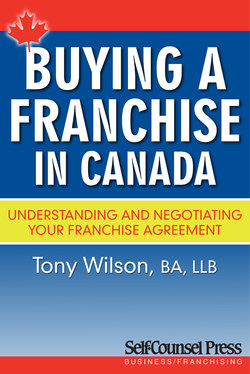Читать книгу Buying a Franchise in Canada - Tony Wilson - Страница 10
На сайте Литреса книга снята с продажи.
4. US Disclosure Agreements and Regulations
ОглавлениеSince the 1970s, US-based franchisors have been subject to a witches’ brew of state and federal laws governing the sale and operation of franchises to franchisees. Currently, US-based franchisors are subject to either the Federal Trade Commission Rule on franchising or a regulatory review in select states. The Federal Trade Commission Rule on franchising requires disclosure of all material facts to prospective franchisees through the use of a disclosure document (sometimes referred to as a Uniform Franchise Offering Circular [UFOC]). This is now called a Franchise Disclosure Document (FDD) in the United States. Franchisors can also be subject to regulatory review in approximately 15 US states that currently have legislation specifically regulating franchisors. As of the date of writing, those states are California, Hawaii, Illinois, Indiana, Maryland, Michigan, Minnesota, New York, North Dakota, Oregon, Rhode Island, South Dakota, Virginia, Washington, and Wisconsin (although some registration requirements differ markedly in these states).
In these registration states, unless the franchisor obtains or otherwise qualifies for an exemption from the authorities, a document similar to a securities prospectus must be prepared by the franchisor’s lawyers, and must usually be filed with and approved by the state regulatory authority together with the franchisor’s franchise agreement, sublease, trade-mark license agreement, general security agreement, and other agreements that normally comprise the package to be signed by the franchisee.
In most cases, the franchisor’s audited or reviewed financial statements must also form part of the disclosure package, which is in and of itself an expensive undertaking. But the state authorities don’t just “rubber stamp” a franchisor just because the franchisor has submitted the documentation to the regulators. The state regulatory authorities read and review the material and may reject the franchisor altogether, or impose conditions on the franchisor’s ability to trade in franchises in that state. This could mean that the franchisor is required to hold a portion of collected initial franchise fees in escrow for a period of time or it may mean capitalization requirements and other conditions.
As you might appreciate, the preparation of these documents by hordes of well-paid attorneys, the vetting process with state regulatory agencies, and the tangled web of rules under which franchisors are required to lawfully “sell” their franchises is extremely complicated, very specialized, and lawyer intensive. It costs a lot of money to start a franchise in the US. Franchising south of the border is not for the faint of heart or those who live in abject fear of large legal bills.
